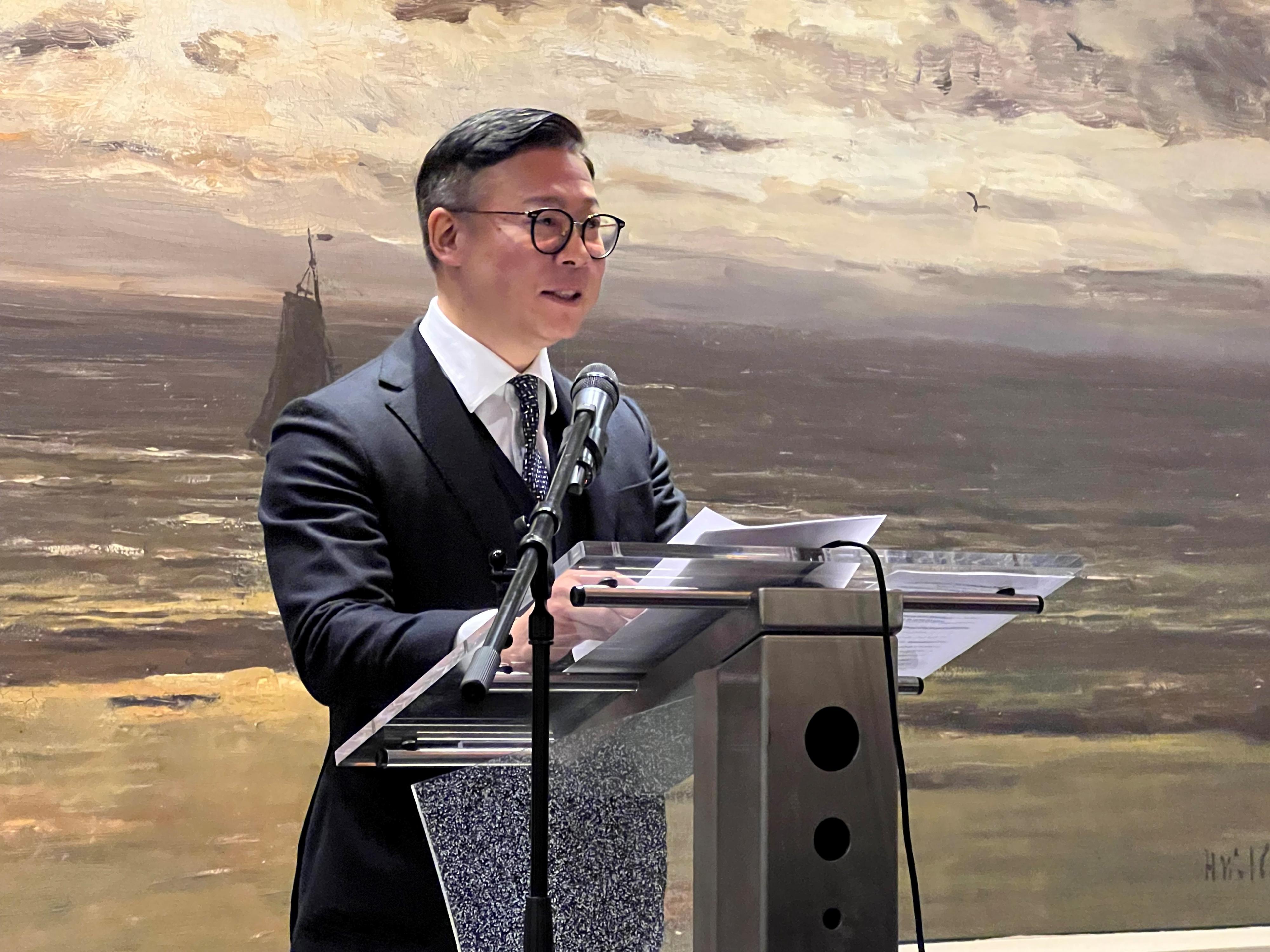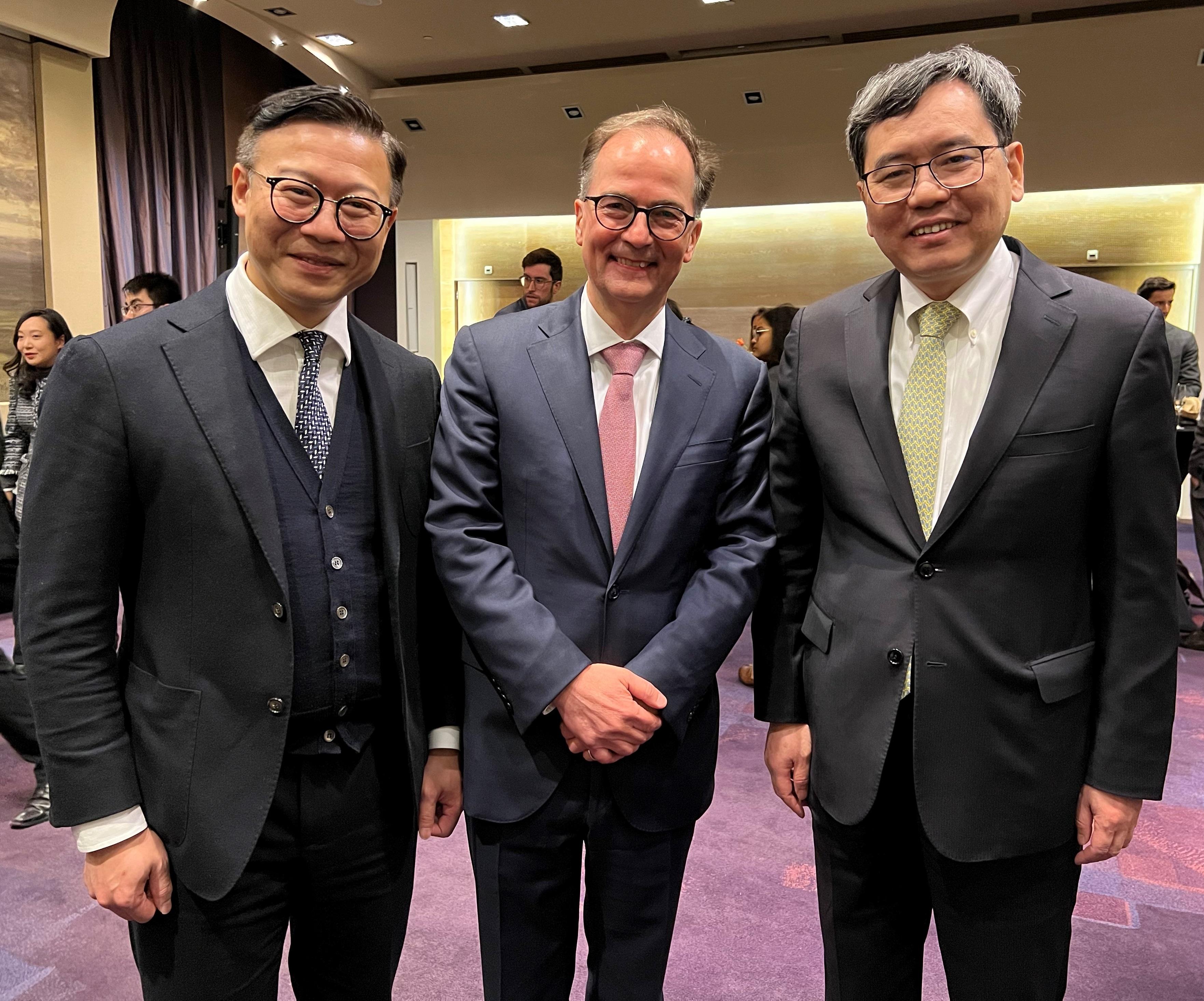Speech by DSJ at Hague Conference on Private International Law Reception in The Hague (English only) (with photos)
******************************************************************************************
Dr Bernasconi (Secretary General of the Hague Conference on Private International Law, Dr Christophe Bernasconi), His Excellency Ambassador Tan (Ambassador Extraordinary and Plenipotentiary of the People's Republic of China to the Kingdom of the Netherlands, Mr Tan Jian), excellencies, distinguished guests, ladies and gentlemen,
Good evening. After welcoming Dr Bernasconi to Hong Kong last November during Hong Kong Legal Week in celebration of both the 10th anniversary of the HCCH Regional Office for Asia and the Pacific (ROAP), which coincides with the 25th anniversary of the establishment of the Hong Kong Special Administrative Region (HKSAR) of the People's Republic of China (PRC) last year, it is our turn to visit him in The Hague in 2023, the year marking the 130th anniversary of the HCCH.
A changing international legal landscape
One hundred thirty years ago, when the first Hague Conference was convened in 1893, the world was different from the present. The legal landscape back then was Eurocentric, with Hague Conferences being predominantly participated in by Europeans. After the two World Wars, the HCCH resurrected itself as an independent inter-governmental organisation with the mandate "to work for the progressive unification of private international law". In the following decades, we have seen more and more member states from Asia joining the HCCH or becoming parties to HCCH instruments. Our country, China, has joined the HCCH since 1987.
Committed to raising the visibility of the HCCH in the region, the HCCH Regional Office for Asia and the Pacific in Hong Kong has made invaluable contribution over the last decade by actively engaging the states in the region and providing advice or technical assistance. This has proven that Hong Kong is an ideal regional hub for the HCCH.
"One country, two systems" and HKSAR's constitutional order
Hong Kong has been a staunch supporter of the HCCH and a frequent user of Hague Conventions. Under the principle of "one country, two systems", a number of Hague Conventions continue to apply to the HKSAR since 1997. Back in 1965, the first Hague Convention applied to Hong Kong was the Apostille Convention. Together with a number of other Hague Conventions, they continued to apply to Hong Kong after its return to the motherland in 1997. There are currently nine Hague Conventions applied to the HKSAR, some of which are not applicable to other parts of China, which illustrates the implementation of the principle of "one country, two systems" in Hong Kong.
Unfortunately, there were unfounded allegations in recent years against the principle of "one country, two systems", the National Security Law enacted in 2020, and the Decision of the National People's Congress on Improving the Electoral System of the HKSAR in 2021.
I must tell you here, loud and clear, that all these accusations are baseless and unsound. The truth is Hong Kong's institution remains intact, and rule of law robust. Rather than being a rein on liberty, the National Security Law fortifies the city's law and order on top of our existing, solid legal inheritance. The improved electoral system upholds and implements the principles of "one country, two systems", "Hong Kong people administering Hong Kong" and a high degree of autonomy. Hong Kong is, and will remain, the world's most desirable foothold of investment in China and the entire Asia-Pacific region.
Sovereignty is the cornerstone of international order. Tobias Asser, the Nobel Peace Prize laureate and the founding father of the HCCH, remarked in 1900: "the foundations will be laid for an international organisation which, without interfering with the complete autonomy of the nations in the domain of legislation, would contribute greatly to the codification of international civil law within the not too distant future."
In accordance with our country's Constitution, the National People's Congress enacted the Basic Law. We must emphasise that the arrangement of "one country, two systems" did not come out of diplomatic negotiations between China and the United Kingdom, but was adopted upon China's own initiative. As remarked by Judge Xue Hanqin, the former Vice President of the International Court of Justice, after Hong Kong's return to China, the system to be adopted in the HKSAR, as well as how to implement its return to the motherland, was purely within the ambit of the sovereignty of China from an international law perspective.
It is the PRC's Constitution that gives the legislative backing and source of power for the Basic Law, and provides a solid legal basis and constitutional framework of the HKSAR. Under "one country, two systems", the central authorities perform overall jurisdictional and constitutional duties as prescribed in the Constitution and the Basic Law, and exercise effective administration over the HKSAR. On this basis, the HKSAR exercises a high degree of autonomy, and fully exercises its administrative, legislative and independent judicial power, including that of final adjudication. At the same time, pursuant to the Basic Law, our common law system is preserved.
Hong Kong is an inalienable part of China, a local administrative region of the PRC exercising a high degree of autonomy and coming directly under the Central Government. The principle of sovereignty should be respected. In fact, international lawyers should be no strangers to the notion of national security. Safeguarding national security is a national matter, and this holds true in any states. It is no exception that our Central Government bears fundamental responsibilities in safeguarding national security.
Intact common law system
As we have seen, the Basic Law keeps Hong Kong's common law system intact. The Central Government fully supports Hong Kong in its effort to maintain its distinctive status and edges, and to maintain the common law.
Hong Kong's common law has its own unique characteristics. Hong Kong adopts a bilingual common law system; both Chinese and English are the official languages. English is the common language of the global business community and its use in Hong Kong as an official language also facilitates business both in and through Hong Kong.
Our courts exercise independent judicial power of adjudication free from any interference. The Basic Law also allows our Court of Final Appeal to invite eminent foreign judges to sit as Non-Permanent Judges, and the judgments of our Court of Final Appeal have been cited by other common law jurisdictions from time to time. Similarly, the Basic Law allows our courts to refer to judicial precedents of other common law jurisdictions.
Ever-growing partnership with the HCCH
Ladies and gentlemen, Hong Kong is committed to the rule of law and the development of private international law. We have fond memories of our years of friendship, and close co-operation with the HCCH, our long-standing partner for decades.
For instance, a colleague of mine, as a member of the Chinese delegation, was also elected as the chair of a Special Commission and a Working Group in relation to the Apostille Convention. In 2019, two informal Working Groups meetings of the Judgments Project took place in Hong Kong, contributing to the successful conclusion of the Judgments Convention.
Our partnership goes further in 2020 with the conclusion of the memorandum of understanding for the technical arrangements relating to the secondment of legal professionals between the HCCH and the HKSAR, thanks to the staunch support of our Central Government.
I must also mention the ROAP, now housed in the Hong Kong Legal Hub at the heart of our city. Established in 2012, the ROAP forges a perfect synergy with Hong Kong in raising the visibility and profile of the HCCH, and promoting HCCH Conventions in the region. As an example, my department worked with the ROAP to strengthen collaboration with regional organisations, by renewing the accredited guest status of the HCCH under the Asia-Pacific Economic Cooperation (APEC) Economic Committee, in order to promote awareness and use of private international law instruments by APEC economies.
We share together a bright future. Hong Kong fully embraces the Guangdong-Hong Kong-Macao Greater Bay Area development, and the Belt and Road (B&R) Initiative launched by our President Xi 10 years ago which is a significant development strategy with the intention of promoting co-operation among countries along the B&R routes. The diverse laws and legal systems of B&R countries pose challenges - and opportunities - of harmonisation of private international law rules, to which we stand ready to make contributions.
Hong Kong has abundant experience in bridging common and civil law divide, with reference to the various mutual legal assistance arrangements concluded with the Mainland. Some of these arrangements are modelled on the Hague Conventions. It testifies the vitality of "one country, two systems", and provides inspiration for international legal development.
Starting a new chapter together
My dear friends, Hong Kong is now back onstage. The recent establishment of the Preparatory Office for the International Organization for Mediation in Hong Kong by China and several other states in Asia, Europe and Africa is the best evidence of confidence shown to us.
Hong Kong is now fully reopened to the world - there will be no quarantine or other movement restriction on enjoying the hustle and bustle of Asia's world city. The HKSAR Government has further launched the "Hello Hong Kong" Campaign. We are inviting prominent guests to come to Hong Kong to see for themselves the welcoming atmosphere, promising opportunities, exciting developments and new attractions here.
Lastly, let me take this opportunity to invite you to come to Hong Kong in person in September during the 6th HCCH Asia Pacific Week, in celebration of the 130th anniversary of the HCCH, to witness the vibrancy, confidence, and prospect of our city and to share your insights and knowledge with academics, officials and professionals of private international law in Asia Pacific and beyond.
On this note, I wish you all an enjoyable evening, and every success for the fruitful conclusion of the CGAP meeting tomorrow. I also look forward to welcoming you to Hong Kong in September. Thank you.
Ends/Friday, March 10, 2023
Issued at HKT 16:57
Issued at HKT 16:57
NNNN
Photo
Related Links
DSJ promotes Hong Kong's unique strengths under "one country, two systems" in Rome (with photos)
Speech by DSJ at UNIDROIT Conference on Promoting Cross-Border Investment through Transnational Legal Standards in Rome (English only) (with photo)
DSJ strengthens HK-UNCITRAL co-operation and promotes Hong Kong as talent hub in practice of international law in Vienna (with photos)
DSJ promotes Hong Kong's legal and dispute resolution services in Geneva (with photos)
Speech by DSJ entitled "Hong Kong, China as a staunch supporter of the rules-based multilateral trading system" at reception hosted by HKETO in Geneva in Switzerland (English only) (with photos)
DSJ highlights Hong Kong's robust rule of law in The Hague (with photos)
DSJ fosters closer connection between HK and UN International Court of Justice and Permanent Court of Arbitration in The Hague (with photos)




